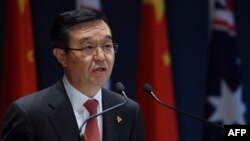Australia, concerned about its vast regional trade network, is joining Japan, India and the United States in countering Chinese expansion in Asia’s biggest maritime dispute.
Six Australian warships were moving toward the South China Sea this week, with no publicized destination, for military exercises. Australian media has called the mission their country’s largest in 30 years.
“There is certainly a view in some quarters in Australia that one of Australia’s contributions to diplomacy and international affairs in Asia is as a security player,” said Jeffrey Wilson, a fellow with the Asia Research Centre at Murdoch University in Perth. “We have a very small defense force, but very high tech, high capacity.”
Australia’s leaders want their electorate, as well as its Asian neighbors, to see Canberra as a defender of rule of law in the South China Sea, consistent with its role since the Cold War, analysts say.
The Australian Department of Defense says that by 2021 it will raise the military budget to 2 percent of GDP, one of the fastest-growing in the Asia Pacific. The budget is $27.4 billion for 2017-2018.
Filling a void
That may effectively help the United States contain China in the sea, where Beijing claims about 90 percent of maritime territory, overlapping the exclusive economic zones of four economically and militarily weaker Southeast Asian states.
U.S. President Donald Trump is more focused on North Korea’s missile buildup than on China’s 7-year-old maritime expansion, a priority of Trump’s predecessor, Barack Obama.
“Australia has been trying to fill that void when necessary,” said Collin Koh, maritime security research fellow at Nanyang Technological University in Singapore.
“So the current times, when it’s quite uncertain what the Trump administration will do for the South China Sea, I think give a lot of currency for Australia to step in, at least fill the void for now,” he said. “I don’t think it’s as ambitious as to fill the entire void, but they want to be seen as playing a part,” Koh said.
Allied with India, Japan, U.S.
India and Japan are picking up some slack by offering aid to some of China’s rival maritime claimants, including the Philippines and Vietnam. That pair, also staunch Western allies skeptical of China’s expansion, confirmed at meetings this month they would focus on Asian maritime security.
India, Japan and the United States hold the annual Malabar exercises, Asian maritime drills that took shape since 1992. Australia has joined, including in 2007 when participants sent 25 vessels to the Bay of Bengal.
From here on, Australia will probably make Southeast Asian port calls and hold naval exercises to remind China it considers the sea an open one, Koh predicts. The navy regularly makes ports of call in the region and in 2015 sent ships to China for joint exercises.
“You might naturally think Australia is in a lucky position in this whole thing because we have no direct participation in any of the disputes,” Wilson said. “We have no skin in the game whatsoever.”
Australia concerned about China
But China has made Canberra nervous by declaring seasonal fishing moratoriums and installing military infrastructure on the South China Sea’s larger islets, moves that analysts mark as evolving de facto Chinese control over the whole resource-rich body of water that stretches from Taiwan to Singapore.
Beijing rejected a July 2016 world arbitration court ruling against the Chinese claim to the 3.5 million-square-kilometer sea. Australia urged it to follow the ruling, drawing a harsh response from China. The Chinese state-run Global Times news website to call the country a “paper cat.”
Australia trades heavily with China and the rest of Asia, and its shipping depends on an open South China Sea, which sees about a third of the world’s marine traffic, valued at an annual $5.3 trillion.
Australian navy chief Tim Barrett said in a speech last month the country’s $1.2 trillion economy depends on “shipping being able to freely navigate the oceans” from the Middle East across the Indian Ocean through the South China Sea and to North America via Japan.
“I would not define Australia as a U.S. proxy,” said Fabrizio Bozzato, a Taiwan Strategy Research Association fellow who is visiting scholars in Australia this month.
“Australia has strategic interests and imperatives of its own,” he said. “It is certainly in Australia’s interests to uphold the current rules-based international order in the Asia Pacific, especially in crucial areas like the South China Sea.”
“I predict that in the future Australia will only become more reliant on the oceans, especially those in our region, not only as the highways of the globalized world economy, but also for both food and other natural resources,” Barrett said.
Reactions will vary
China will take note of Australia’s determination to patrol the South China Sea this month, scholars say, while Southeast Asian countries will welcome it. Brunei, Malaysia, the Philippines and Vietnam contest some of China’s claims.
“Littoral states (those on the South China Sea) would welcome Australia playing a generally positive role in enhancing peace and security in the South China Sea,” said Oh Ei Sun, international studies instructor at Singapore Nanyang University.







